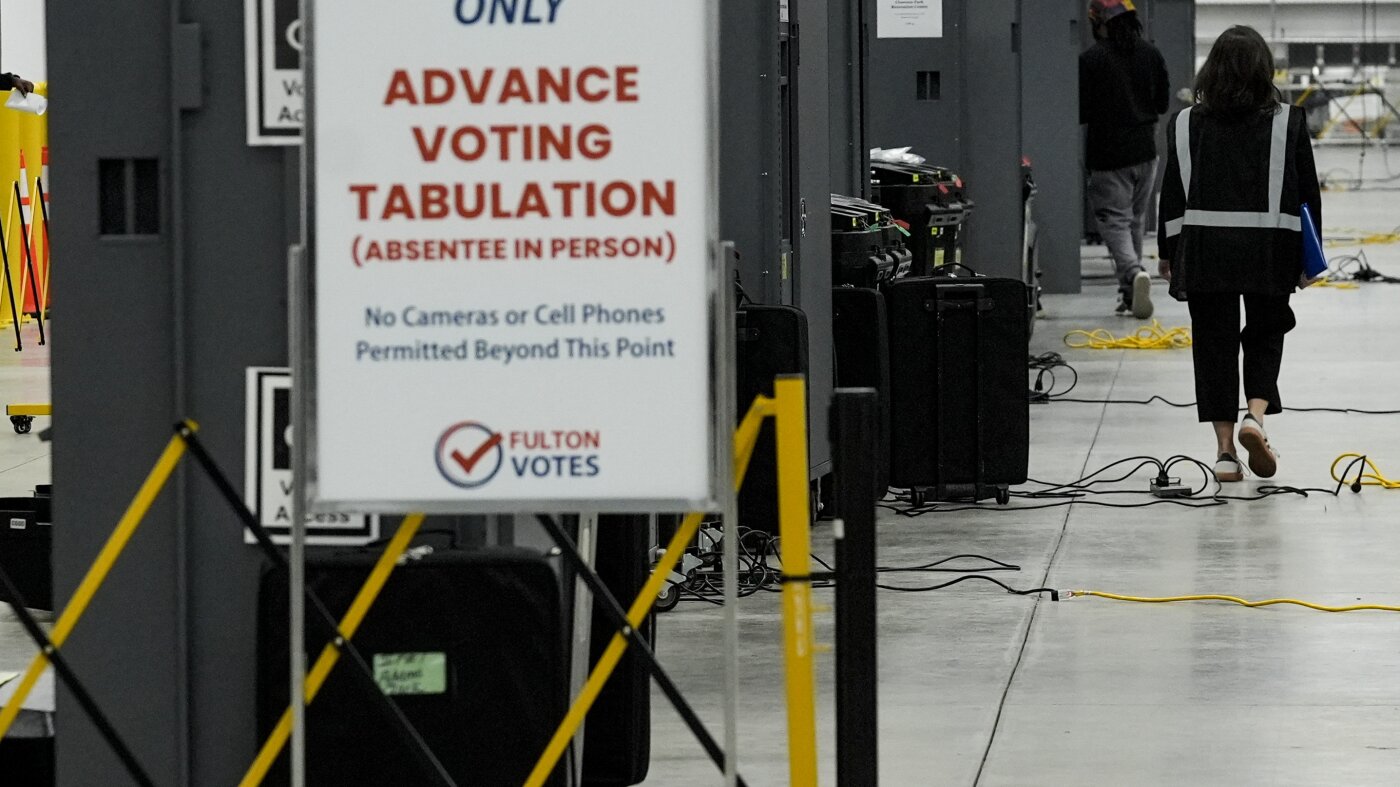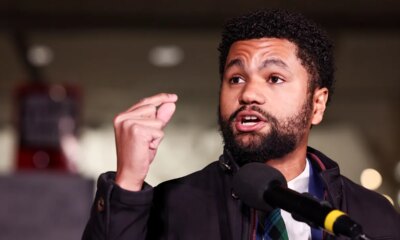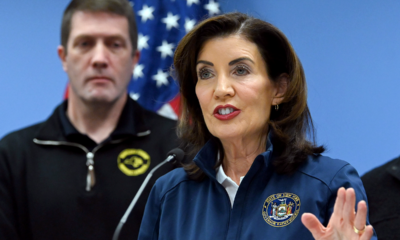Politics
Opinion: After the Trump shooting, Congress needs to keep the peace

At Monday’s congressional hearing on the Secret Service and the assassination attempt against former President Donald Trump, Rep. Raja Krishnamoorthi asked: “What can Congress actually do to stop this from happening again?”
The congressman, a Democrat from Illinois, then showed the chamber a graphic on political violence that was published a month ago by the Chicago Project on Security and Threats, which I lead. The graphic shows that 74% of Americans want members of Congress to come together to denounce all political violence. This stance crosses party lines, with 86% of Democrats, 51% of independents and 70% of Republicans saying so.
(Chicago Project on Security & Threats)
While individual members of Congress have made statements denouncing the Trump assassination attempt, Krishnamoorthi challenged the entire House of Representatives to go much further, proposing a resolution in the near future “condemning any political violence in America” and calling for support from every member of the chamber. Such resolutions go to the House for a vote and are not signed into law, but they convey a message — especially when they pass unanimously.
After Monday’s grueling hearing, the head of the Secret Service resigned on Tuesday, writing to her staff: “I take full responsibility for the security lapse.” That departure will not prevent future bloodshed. However, Congress has a chance to do so.
At this critical time, members of Congress — both Republicans and Democrats — must stand together to oppose political violence. The Trump shooting is only the latest of a growing string of incidents. Indeed, we are seeing the most violent era in American politics in decades, and now is certainly the time for all political leaders at all levels of government — national, state and local — to adopt similar resolutions and make similar unified statements.
Political violence in the United States is entering a new stage as America faces mounting domestic terrorism: violent anti-government and other political actions by militias, small groups and volatile individuals within the United States.
To be sure, famous acts of domestic terrorism occurred from the 1990s through 2010, including the violent standoff at Ruby Ridge in 1992, the Oklahoma City bombing in 1995, the violent protests against the World Trade Organization meeting in Seattle in 1999, and the multiple arsons and bombings conducted by individuals affiliated with the Earth Liberation Front and Animal Liberation Front from 1995 to 2010.
What’s happening now is different. Political violence in America is escalating, both in number and in kinds of violent incidents. Since even before the pandemic, America has witnessed an era of political violence unparalleled at least since the 1960s. Incidents of domestic terrorism increased by 357% between 2013 and 2021, according to statistics collected by the FBI and the Department of Homeland Security.
Collective political violence is rising too. Since summer 2020, the United States has seen major political riots against police and downtown businesses during some of the George Floyd protests; a brazen assault on the U.S. Capitol to stop the peaceful transfer of power on Jan. 6, 2021; spikes of campus unrest to protest the conflict in Gaza in fall 2023 and spring 2024; and numerous lone wolf attacks and plots — including against the husband of then-Speaker Nancy Pelosi, against Justice Brett Kavanaugh and against Michigan Gov. Gretchen Whitmer.
To better understand this new era, the Project on Security and Threats has set up more than a dozen national surveys in the three years since Jan. 6, 2021. These rely on high-quality nationally representative samples that match the American adult population on a vast number of demographic, political, economic, social and other factors, meaning it is reasonable to extrapolate the findings to the U.S. population as a whole.
The striking finding from our June 24 survey is that 10% of American adults — the equivalent of 26 million people — agreed that “the use of force is justified to prevent Donald Trump from being president.” The poll also found that 7% of American adults — the equivalent of 18 million people — support the use of force to restore Trump to the presidency.
The assassination attempt against Trump less than three weeks later did not come out of nowhere. The shooter’s motive is not yet clear — he seems to have researched President Biden as a target as well — but in any case, we need to be concerned about copycat and retaliatory violence by volatile individuals steeped in incendiary political rhetoric, beset by mental illness or simply looking to gain notoriety. Such spirals of violence could occur against many political leaders and at numerous flashpoints in the months ahead during and after the presidential election.
No one can entirely prevent that, but for lawmakers, the next step is clear: Accept Krishnamoorthi’s challenge and pass a resolution, unanimously, condemning political violence. This could make a major difference.
Just as studies show that incendiary political rhetoric encourages support for political violence, so too would public condemnation reduce it. Those taking violent political action are often volatile individuals, with their own reasons to act out, but also encouraged by the perceptions that they are serving some greater good. Some hope to be glorified as warriors for a cause. Leaders of those causes should make clear that no one who engages in political violence will be glorified.
The most effective message to reduce support for violence is a simple one: Political violence, wherever it comes from, is illegal, immoral and anti-American. Leaders should also contribute to a culture of prevention by encouraging political anger to be redirected away from negative expression as violence and toward positive expression as voting.
Since the assassination attempt, Biden has already given multiple speeches along just these lines. I hope that his courage will be contagious and that Congress will do its part. It is possible to reverse the rising violence and return to the peaceful traditions that made American democracy the envy of the world.
Robert A. Pape, a professor of political science at the University of Chicago, is the director of the Chicago Project on Security and Threats.

Politics
Graham pushes back on Tillis’ criticism of Noem, Miller for labeling man killed by Border Patrol a ‘terrorist’

NEWYou can now listen to Fox News articles!
Sen. Lindsey Graham, R-S.C., on Tuesday defended Homeland Security Secretary Kristi Noem and Homeland Security Advisor Stephen Miller after Sen. Thom Tillis, R-N.C., criticized the pair for labeling the U.S. citizen killed by Border Patrol agents in Minneapolis as a “domestic terrorist.”
Tillis was the first Senate Republican to call for Noem to be fired after the killing of Alex Pretti, 37, who was shot by federal agents as he was recording immigration enforcement operations in Minneapolis over the weekend.
“What she’s done in Minnesota should be disqualifying. She should be out of a job,” Tillis told reporters earlier on Tuesday. “It’s just amateur-ish. It’s terrible. It’s making the president look bad on policy that he won on. [President Donald Trump] won on a strong message on immigration. Now, nobody’s talking about that. … They’re talking about the incompetence of the leader of Homeland Security.”
Noem and Miller “told the president before they even had an incident report whatsoever that the person who died was a terrorist. That is amateur hour at its worst,” Tillis added.
SENATE GOP CRITICS SAY NOEM ‘NEEDS TO GO’ AMID FALLOUT FROM MINNEAPOLIS SHOOTINGS
Sen. Lindsey Graham defended Homeland Security Secretary Kristi Noem and Homeland Security Advisor Stephen Miller on Tuesday. (AP Photo/Susan Walsh)
Responding to Tillis, Graham said someone “must have a very high opinion of themselves” if they believe they can get President Donald Trump to distance himself from Miller.
“I’ve known Stephen Miller for a very long time. We have our differences, but we have more in common. When the clock strikes midnight for President Trump, there will be very few by his side. One will be Stephen Miller. If you don’t get that, you’ve missed a lot. No one has helped Trump more than Stephen Miller,” Graham told Fox News’ Chad Pergram.
“To convince yourself that you can get Trump to distance himself from Stephen Miller, you must have a very high opinion of themselves,” he continued.
The South Carolina lawmaker added: “To my Republican colleagues, you need to understand that the President’s confidence in Stephen Miller has been rock solid and unshakable. And Miller is part of that group.”
Sen. Thom Tillis was the first Senate Republican to call for DHS Secretary Kristi Noem to be fired after the killing of Alex Pretti. (Tom Williams/CQ-Roll Call, Inc via Getty Images)
Alex Pretti, 37, was shot and killed on Saturday by Border Patrol agents while recording federal immigration operations in Minneapolis. An ICU nurse, Pretti appeared to be attempting to attend to a woman agents knocked down when he was sprayed with an irritant, pushed to the ground and beaten. An agent was seen pulling Pretti’s lawfully owned gun from his waistband before other agents fired several shots and killed him.
Noem was quick to label Pretti a “domestic terrorist,” and Miller characterized him as things such as a “would-be assassin,” both of which are unsubstantiated claims that sparked bipartisan pushback.
The White House has sought to distance itself from the comments by Noem and Miller, with White House press secretary Karoline Leavitt saying she has “not heard the president characterize” Pretti that way.
But despite calls from Democrat and Republican lawmakers to oust Noem over her response to Pretti’s killing, Trump expressed confidence in the secretary to continue leading DHS.
NY POST, WSJ, NY TIMES AND WASHINGTON POST ALIGN AGAINST TRUMP ADMIN OVER ICE OPERATION IN MINNEAPOLIS
President Donald Trump expressed confidence in DHS Secretary Kristi Noem to continue leading the department. (Demetrius Freeman/The Washington Post via Getty Images)
CLICK HERE TO DOWNLOAD THE FOX NEWS APP
“I think she’s doing a very good job. The border is totally secure. You know, you forget we had a border that I inherited where millions of people were coming through. Now we have a border where no one is coming through. They come into our country only legally,” Trump told reporters on Tuesday.
Asked if he agreed with Noem and Miller labeling Pretti as a “domestic terrorist” and an “assassin,” the president said he had not heard those remarks.
“Well, I haven’t heard that. He shouldn’t have been carrying a gun,” Trump said.
Trump also said the shooting was a “very sad situation” and he wants a “very honorable and honest investigation” that he wants to see for himself.
Politics
Charter Reform Commission, L.A. City Council look to impose transparency rules

The Los Angeles City Council voted Tuesday to approve a law aimed at boosting transparency at the Charter Reform Commission, by requiring that members of that panel disclose any private talks they have with the city’s elected officials.
The vote comes about two months before the commission, which began its work in July, is scheduled to finish its deliberations and deliver a list of recommendations to the council.
Councilmember Monica Rodriguez, who proposed the ordinance, said she has been trying since August to pass a measure requiring the disclosure of such private conversations, known as “ex parte” communications. That effort was greeted with “nearly six months of stonewalling,” she said.
“While this is an important victory for oversight and transparency, government accountability shouldn’t be this hard to secure,” she said.
The ordinance, which also applies to communications between commissioners and elected officials’ staff, is expected to go into effect in about a month. Meanwhile, the 13-member Charter Reform Commission approved its own policy a week ago requiring the disclosure of private conversations between its members and city elected officials.
Some government watchdogs say the disclosures are needed to prevent council members and other city elected officials from seeking to dictate the details of the recommendations that are ultimately issued by the commission. The volunteer citizens panel is currently looking at such ideas as increasing the size of the council and potentially changing the duties of citywide elected officials.
“If the public is going to trust the outcomes of our charter reform process, it has to be transparent and credible,” Commissioner Carla Fuentes, who pushed for the new disclosure policy at its Jan. 21 meeting.
The commission has not yet voted on a proposal to also require disclosure of communications with elected officials’ staff.
It is also looking at the idea of adopting ranked choice voting, where voters list all of the candidates in order of preference, and switching the city to a multi-year budget process.
Councilmember Bob Blumenfield raised warnings about the council’s vote on Tuesday, saying charter reform is substantively different from the 2021 redistricting process. Council members should be engaging in conversations with its volunteer commissioners, to help them better understand how the city is run, Blumenfield said.
Those communications will ensure the commissioners make an informed decision what to recommend for the ballot later this year.
“I don’t want this message to be that it’s somehow bad for council members and the mayor and elected officials to be engaging in this process,” he said. “To the contrary, I think we need to double down our engagement. We need to speak to those commissioners. They need to learn a lot more about how this city really works for this thing to be effective.”
The commission is scheduled to take up the motion to disclose staffer conversations at its next meeting on Feb. 7.
Rob Quan, an organizer with the group Unrig LA, said he doesn’t want to see a repeat of 2021, when members of the citizens commission on redistricting were regularly contacted by council members’ aides. Those ex parte communications were not disclosed, he said.
“If it didn’t apply to staff, we would simply be reinforcing the power of the staff, which have from Day One been the most problematic aspect of this commission,” said Quan, whose group focuses on government oversight.
He and a group of other transparency activists have proposed a total ban on ex parte communication, which hasn’t been considered by the current commission.
Politics
Democrats demand Kristi Noem be fired or warn impeachment will follow

NEWYou can now listen to Fox News articles!
House Democrats ramped up pressure on Department of Homeland Security (DHS) Secretary Kristi Noem on Tuesday, calling for her firing and warning that impeachment proceedings would follow if she remains in office, citing deadly actions by federal agents in Minnesota.
The calls came from both House Democratic leadership and Judiciary Committee Democrats, marking a coordinated escalation from public condemnation to formal impeachment threats.
In a joint statement, House Democratic Leader Hakeem Jeffries, Democratic Whip Katherine Clark and Democratic Caucus Chair Pete Aguilar accused the Trump administration of using federal law enforcement to carry out deadly violence.
“Taxpayer dollars are being weaponized by the Trump administration to kill American citizens, brutalize communities and violently target law-abiding immigrant families,” the leaders said. “The country is disgusted by what the Department of Homeland Security has done.”
NOEM SAYS SHE GRIEVES FOR FAMILY AFTER CBP-RELATED SHOOTING IN MINNEAPOLIS, VOWS THOROUGH INVESTIGATION
House Democrats ramped up pressure on DHS Secretary Kristi Noem on Tuesday. ( Al Drago/Getty Images)
The leaders warned that unless Noem is removed, impeachment proceedings would follow.
“Kristi Noem should be fired immediately, or we will commence impeachment proceedings in the House of Representatives,” the statement said.
“We can do this the easy way or the hard way.”
The demands come as Noem faces widespread criticism after federal agents killed two U.S. citizens in Minnesota this month.
Separately, Rep. Jamie Raskin of Maryland, the ranking Democrat on the House Judiciary Committee, called on Judiciary Committee Chairman Jim Jordan, R-Ohio, to immediately begin impeachment proceedings if Noem is not fired or forced to resign.
“Unless Secretary Noem resigns or is fired, the Judiciary Committee’s Chairman, Jim Jordan, should immediately commence House Judiciary Committee impeachment proceedings to remove her from office,” Raskin said.
BORDER PATROL COMMANDER GREGORY BOVINO TO LEAVE MINNESOTA, AS TOM HOMAN TAKES OVER
Federal agents try to clear demonstrators near a hotel, using tear gas during a noise demonstration protest in response to federal immigration enforcement operations in Minneapolis. (Adam Gray/AP Photo)
Raskin accused Noem of overseeing what he described as unlawful killings and a subsequent cover-up.
“Far from condemning these unlawful and savage killings in cold blood, Secretary Noem immediately labeled Renée Good and Alex Pretti ‘domestic terrorists,’ blatantly lied about the circumstances of the shootings that took their lives, and attempted to cover up and blockade any legitimate investigation into their deaths,” he said.
Separately, Sen. John Fetterman, D-Pa., called on Trump to fire Noem directly on Tuesday.
In a post on X, the senator accused Noem of “betraying” the department’s central mission.
In a joint statement with other Democratic leaders, Hakeem Jeffries, D-N.Y., accused the Trump administration of using federal law enforcement to carry out deadly violence. (Roberto Schmidt/Getty Images)
However, President Donald Trump confirmed on Tuesday that he has no plans to ask Noem to step down from her role.
Trump was asked about Noem’s status during a gaggle with reporters outside the White House. He told the press that he still thinks Noem is doing a “great job.”
CLICK HERE TO DOWNLOAD THE FOX NEWS APP
“Is Kristi Noem going to step down?” a reporter asked.
“No,” Trump responded bluntly.
He later said he believes she is doing a “very good job,” citing her role in closing down the border.
Fox News’ Anders Hagstrom contributed to this report.
-

 Illinois6 days ago
Illinois6 days agoIllinois school closings tomorrow: How to check if your school is closed due to extreme cold
-

 Pittsburg, PA1 week ago
Pittsburg, PA1 week agoSean McDermott Should Be Steelers Next Head Coach
-

 Pennsylvania2 days ago
Pennsylvania2 days agoRare ‘avalanche’ blocks Pennsylvania road during major snowstorm
-

 Lifestyle1 week ago
Lifestyle1 week agoNick Fuentes & Andrew Tate Party to Kanye’s Banned ‘Heil Hitler’
-

 Sports1 week ago
Sports1 week agoMiami star throws punch at Indiana player after national championship loss
-

 Cleveland, OH1 week ago
Cleveland, OH1 week agoNortheast Ohio cities dealing with rock salt shortage during peak of winter season
-

 Technology6 days ago
Technology6 days agoRing claims it’s not giving ICE access to its cameras
-

 Science1 week ago
Science1 week agoContributor: New food pyramid is a recipe for health disasters


















